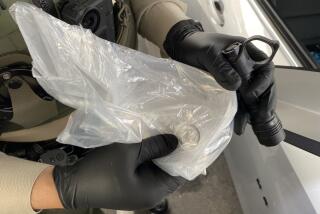IPhone raid puts high-tech enforcement squad in spotlight
- Share via
Reporting from Los Angeles and San Francisco — When a top-secret prototype of Apple Inc.’s new iPhone went missing recently, the computer giant summoned Silicon Valley’s version of the cavalry -- an elite squad whose main mission is investigating crimes against high-tech companies.
Little-known outside the tech world, the unit is suddenly in the spotlight for its April 23 raid on the Bay Area home of Jason Chen, the 29-year-old technology blogger who had gained possession of the missing phone.
The unit swept in after Chen posted a photo and details of the new iPhone on the Gizmodo.com website. But the raid itself has become secondary to a larger debate burning up Silicon Valley and the blogosphere: What is this high-tech police force, and who controls it?
“It’s the iPolice,” said Steve Meister, a former Los Angeles County deputy district attorney. “This whole thing appears, rightly or wrongly, to be law enforcement doing the bidding of a private company.”
The task force, called REACT (for Rapid Enforcement Allied Computer Team), is a kind of SWAT team, chartered in 1997 to focus on “large-scale crimes that victimize the high technology industry in the Bay Area.”
The unit is composed of 30 investigators and prosecutors on loan from local, state and federal agencies in the Bay Area, including the FBI and the Secret Service. These various jurisdictions cover some of the salary costs under their own budgets; the rest of comes from a $2.3-million allotment from the state and Santa Clara County.
Led by the Santa Clara County district attorney’s office the task force investigates a variety of fraud, piracy and identity theft cases on behalf of both individuals and corporations.
But the recent raid has renewed worries about the close ties between the industry and specialized enforcement units such as REACT. One concern is that Apple and other high-profile tech companies, because of the economic benefits they bring to the state and their close relations with REACT, get a higher level of service and attention than other businesses and individuals. In 2008, technology industry payrolls pumped more than $100 billion into the California economy.
“There are a lot of serious crimes that get committed in California that don’t get these kinds of resources,” said Michael Risher, staff attorney at the Northern California chapter of the American Civil Liberties Union. “Hopefully sooner rather than later we will know what’s going on here and whether their actions were justified.”
Though Apple would not comment on its ties with REACT, state documents show it has collaborated with the task force in the past. Last year, REACT reported working with “an Apple investigator” on a case in which an Apple employee stole more than $100,000 worth of computers and sold them on EBay.
REACT task force leader Michael Sterner, an investigator with the Santa Clara County district attorney’s office, said it’s not uncommon for investigators to make use of intelligence from firms’ internal security teams, or to consult with companies’ security personnel as cases move forward.
But, Sterner emphasized, “we don’t take directions on our investigations.”
In 2005, REACT, working with the FBI, seized nearly half a million counterfeit DVDs and CDs containing music and software programs in what was billed as the nation’s largest disc piracy case ever. The resulting convictions drew plaudits from the Recording Industry Assn. of America and from software makers Adobe Systems Inc. and Symantec Corp.
In 2006, two Bay Area residents were convicted in federal court of fraudulently reselling more than $29 million worth of Microsoft software in a scheme exposed by a team that included REACT.
“There’s a recognition that you have to be responsive when there’s a potential impact on the city, county or state economy when it comes to cases like that,” said Paul Weber, president of the Los Angeles Police Protective League. “It’s a fine balance between preserving the local economy and providing the meat-and-potatoes policing. I don’t think one excludes the other.”
Silicon Valley prosecutors are sensitive to allegations of being too cozy with companies after a long history of instances in which law enforcement agencies were showered with hundreds of thousands of dollars in grants and equipment by tech firms to help combat crimes.
“There is a keen awareness of the necessity to insulate ourselves from industry,” said Santa Clara County Deputy Dist. Atty. James Sibley, who headed REACT for six years. “I don’t want to hurt Steve Jobs’ feelings, but he doesn’t pull our strings.”
Still, Apple is one of a number of high-profile technology companies that sits on REACT’s steering committee, a board that offers the task force “advice, recommendations and strategic input and direction” about high-tech crimes, according to a REACT spokesman.
Among the other companies listed as on the steering committee in a 2008 document were Google Inc., Microsoft Corp., EBay, Palm Inc., and Oracle Corp.
Several current and former REACT officials said the steering committee meetings are largely a forum for companies and the task force to discuss about trends they’re seeing in high-tech crime.
This is not the first time that ties between private industry and law enforcement — whether real or perceived — have drawn attention.
Public defenders have criticized prosecutors for accepting tens of millions of dollars every year from the California Department of Insurance. The grants, funded largely by fees paid by insurance companies, are earmarked for fighting insurance fraud.
In gambling states, some police and prosecutors have tracked down thousands of gamblers who failed to pay their debts to major casinos with a fervor that legal scholars have said borders on misuse of the justice system.
In the 1990s, many technology companies around the country helped pay for equipment and personnel in police departments that couldn’t afford to fund their own tech crimes outfit.
In one example, Intel Corp. presented the police department in Hillsboro, Ore., with a $100,000 donation to fund the salary and expenses of one officer on the seven-person computer crimes team. Over a five-year period ending in 1999, about 40% of that team’s cases involved Intel in some way.
REACT officials said the task force does not accept any funds or equipment from technology companies. But the REACT website says the industry councils and companies “provide specialized training, liaison personnel and internal support for task force investigations.”
Joseph D. McNamara, who was police chief in San Jose for 15 years and is now a fellow at the Hoover Institution, said the links between law enforcement and industry are more subtle than outright string-pulling. To learn how to catch high-tech criminals, he said, law enforcement agencies often have little choice but to seek help from the companies that create and sell the technology with which many of the crimes are committed.
It’s that connection, McNamara said, that “could create a dependency and a kind of low-visibility relationship where law enforcement have to rely on industry expertise.”
The task force’s priorities, then, “could consciously or unconsciously be shaped by companies with a vested interest.”
In the case of the missing iPhone, law enforcement officials say it required special attention because the device was no ordinary cellphone. The prototype included features that Apple has guarded zealously and which it probably believes give it a competitive advantage over its rivals. Chen’s editor said Gizmodo paid $5,000 to a man who claimed to have found it at a beer garden in Redwood City, Calif.
But when officers raided Chen’s house they were not actually looking for the wayward phone. Apple had already picked up the device from Chen’s home four days earlier.
REACT was called in anyway. Chen was not home at the time, so the investigators broke down his door and hauled away several computers, hard drives and boxes of documents. Investigators said they were looking for evidence related to the theft of a phone.
Gizmodo is challenging the search warrant, saying it violates shield laws protecting reporters from search and seizure without a subpoena. Bloggers, like traditional journalists, also have certain special protections under state and federal law. Investigators said they are holding off examining the seized equipment until the dispute is resolved.






